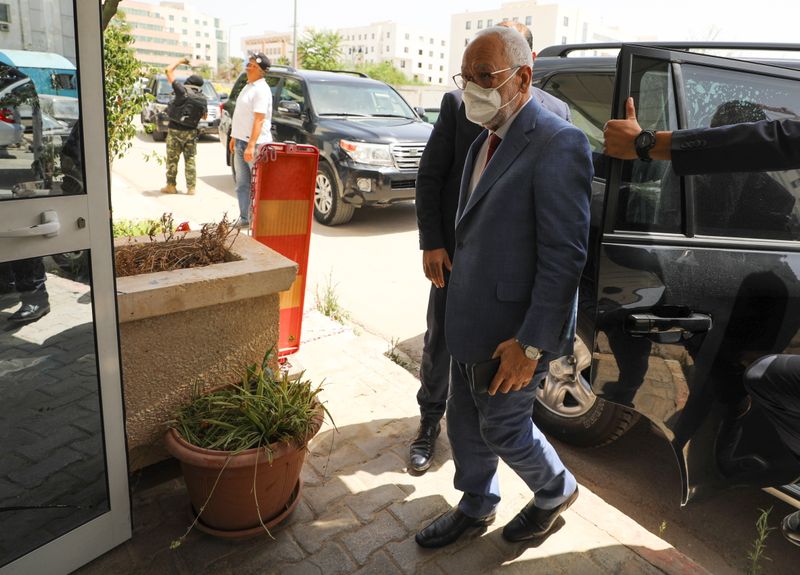By Tarek Amara and Angus McDowall
TUNIS (Reuters) - Tunisia's crisis has thrown the fate of its much-lauded young democracy into the balance - and with it that of the Ennahda party, a mainstream Islamist movement that has played a uniquely central role in an Arab state through the ballot box.
President Kais Saied's decision to seize control of government, dismiss the premier and suspend parliament has cast doubt over Tunisia's democracy and Ennahda's place in it, kindling fierce debate in the party over how to respond.
Since Tunisia's 2011 revolution triggered the "Arab Spring" uprisings, most Islamist parties in Arab countries have either faced violent suppression or been co-opted into political systems where ultimate power is held by authoritarian leaders.
In Tunisia by contrast, Ennahda - outlawed before 2011 - has been integral to successive coalition governments and is now the largest party in the fragmented parliament, with its leader Rached Ghannouchi serving as speaker.
It has for years worked with secularists in government and supported crackdowns on violent Islamist groups such as Islamic State in the North African country.
But, already under investigation over financing violations in the last election, which it denies, Ennahda has been rendered more vulnerable by the political crisis than at any time since the 2011 revolution.
Party officials see a risk of the crisis morphing into an existential threat to Ennahda, either by leading to a new era of polarisation pitting Islamists against other forces, or via a crackdown if Saied shifts towards an authoritarian course.
Ghannouchi quickly responded by calling the moves a coup. In so doing he placed himself at the forefront of opposition to Saied, a political independent who won the 2019 election with promises to fight corruption and stagnation. But Ghannouchi has also urged supporters to stay calm and off the streets.
An internal debate on how best to handle the crisis has wrought angry disagreements within Ennahda, exacerbating existing divisions among party officials over its strategy and leadership, several insiders said.
"No one can deny that there are clear differences within Ennahda...The differences are more direct and clear after the recent political earthquake," said a senior party official, speaking on condition of anonymity.
Although it has retained a staunchly loyal base of supporters, who turned out in February for a massive rally in Tunis in a show of strength, the party has been closely associated with years of economic failure.
That has dented the popularity of Ennahda, along with its role in fractious national politics that many Tunisians blame for paralysing misgovernance, as unemployment has risen and public services declined.
On Sunday, in nationwide anti-government demonstrations that spurred Saied to act, protesters attacked Ennahda branches.
Saied said his takeover is permitted under the constitution to avert disorder caused by the COVID-19 pandemic and political dysfunction and said parliament will be frozen only for 30 days.
DIALOGUE OR CONFRONTATION?
Ghannouchi initially called for people to come out against Saied as protesters did against a veteran autocratic leader in 2011, and led a sit-in outside parliament, before backing down and urging calm and dialogue.
"There is awareness within Ennahda that we need to avoid escalation and must keep calm in our democracy," said Maher Madhioub, a Ghannouchi adviser. "No one wants violence and civil war here, though we insist that it is a coup."
Ennahda was shaped by decades of repression before the revolution and then the example after the Arab Spring of Egypt, where the Muslim Brotherhood won a free election in 2012 but was ousted by the military a year later and violently suppressed.
"We do not want to see the Rabaa scenario repeated in Tunisia and people killed and it ending with Islamists being erased," said Madhioub, referring to the Cairo square where hundreds of Muslim Brotherhood supporters were killed when security forces broke up their sit-in in 2013.
However, the decision was opposed by other figures inside Ennahda, who thought backing down would allow Saied to easily crack down on the movement. Avoiding confrontation will "carry a high price" said one official.
It comes after two years of internal wrangling over strategy that has put the leadership of Ghannouchi - a former political prisoner and exile who returned to a tumultuous welcome after the revolution - into doubt.
Ennahda had steadily lost support over the past decade as it touted a moderate ideological stance and backed successive governments that imposed spending cuts which hit hardest in the impoverished regions where the party had been strongest.
Its vote share fell in successive elections until 2019 when, despite doing better than its rivals, it took only a quarter of seats in parliament.
In a simultaneous presidential election, Ennahda's candidate lost in the first round and it endorsed Saied in a run-off against media mogul Nabil Karoui, who faced corruption charges.
Despite initially supporting Saied's presidency, Ghannouchi later joined Karoui's Heart of Tunisia party in backing Prime Minister Hichem Mechichi in a dispute with the president.
The strategy, meant to bolster Ennahda's sway in government, dismayed some younger members and split the leadership. Last year 100 members called on Ghannouchi to drop his conciliatory approach and commit to sweeping reforms, and to eventually step down.
